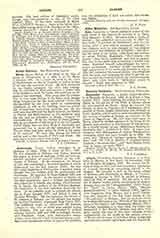

Aldrovandi, ULISSI, Italian naturalist, b. at Bologna, September 11, 1522; d. there November 10, 1607. He was educated in Bologna and Padua, received the degree of doctor of medicine (1553) and was appointed professor of natural history in the University of Bologna. At his instigation, the Senate of that city established a botanical garden of which Aldrovandi was the first director (1568). He was also made Inspector of Pharmacies, a position which brought him into conflict with the apothecaries and physicians. He appealed to Pope Gregory XIII and was sustained (1576). In the interest of science, he travelled extensively, spent a fortune, and gathered rich collections in botany and zoology which became, by his legacy, the nucleus of the Bologna Museum. His herbarium is the first collection deserving the name. In his scientific work he enjoyed the patronage of Popes Gregory XIII, and Sixtus V, and of Cardinal Montalto. He was buried in the church of St. Stephen at Bologna, and his epitaph was written by Cardinal Barberini, afterwards Pope Urban VIII. The published works of Aldrovandi fill fourteen volumes in folio, four of which were printed during his lifetime. The rest were published in various editions between 1599 and 1700 at Bologna, Venice, and Frankfort. These, with Aldrovandi’s manuscripts, cover the entire field of natural history, making a vast compilation which, in spite of its prolixity, won the admiration of later naturalists like Cuvier and Buff on.
E. A. PACE

